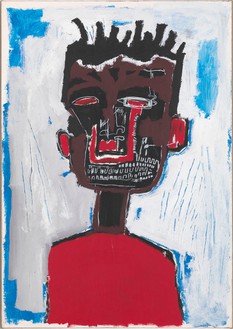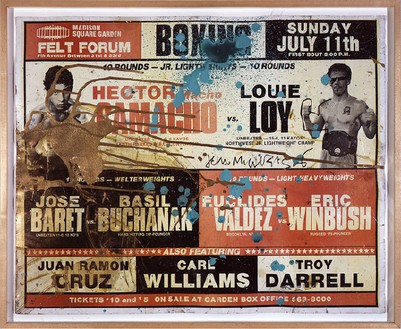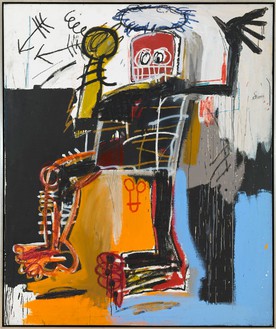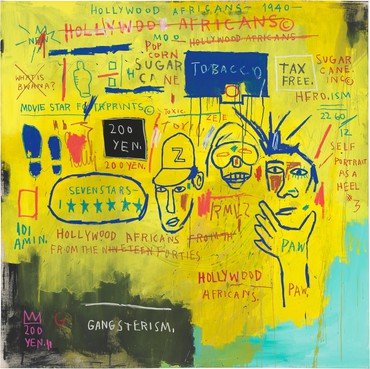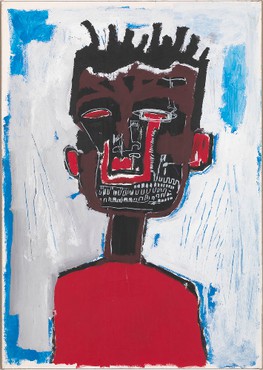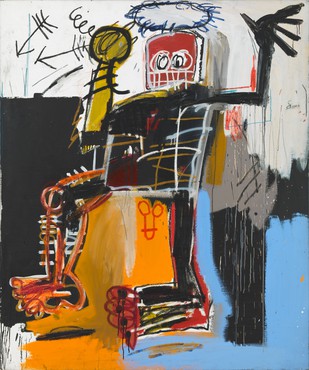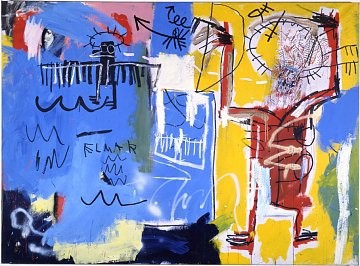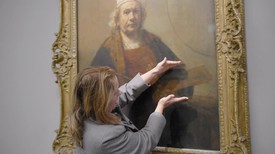About
Jean-Michel Basquiat was born in 1960 in New York City, where he died in 1988. Born to a Haitian father and a Puerto-Rican mother, Basquiat left his family home in Brooklyn, New York at the age of fifteen and took to the streets. A voracious autodidact, he quickly became a denizen of the explosive and decadent New York underground scene—a noise musician who loved jazz, and a street poet who scrawled his sophisticated aphorisms in Magic Marker across the walls of downtown Manhattan, copyrighting them under the name SAMO. In 1981, he killed off this alter ego and began painting and drawing, first on salvaged materials then later on canvas and paper, and making bricolage with materials scavenged from the urban environment. From the outset he worked compulsively; his passion for words and music, his intense yet fluid energy, and the heterogeneous materials that he employed so freely imbued his work with urgency and excitement. He sold his first painting in 1981, and by 1982, spurred by the Neo-Expressionist art boom, his work was in great demand. In 1985, he was featured on the cover of The New York Times Magazine in connection with an article on the newly exuberant international art market. In that photograph, Basquiat is a vision of cool, sprawled in a chair in an elegant three-piece suit and tie, with bunched dreadlocks and bare feet, in front of a large, bold painting—a supernova in the making.
Charismatic image aside, Basquiat was a prodigious young talent, fusing drawing and painting with history and poetry to produce an unprecedented artistic language and content that bridged cultures and enunciated alternative histories. Combining materials and techniques with uninhibited yet knowing and precise intent, his paintings maintain a powerful tension between opposing aesthetic forces—expression and knowledge, control and spontaneity, savagery and wit, urbanity and primitivism—while providing acerbic commentary on the harsh realities of race, culture, and society.
Basquiat is represented in several prominent museum collections all over the world. Major solo exhibitions include “Jean-Michel Basquiat: Paintings 1981–1984,” Fruitmarket Gallery, Edinburgh (1984; traveled to the Institute of Contemporary Arts, London; and the Museum Boijmans Van Beuningen, Rotterdam, through 1985); Whitney Museum of American Art, New York (1992; traveled to the Menil Collection, Houston; the Des Moines Art Center, Iowa; and the Montgomery Museum of Fine Art, Alabama, through 1994); “Basquiat,” Brooklyn Museum of Art, New York (2005; traveled to the Museum of Contemporary Art, Los Angeles; and the Museum of Fine Arts, Houston, through 2006); Fondation Beyeler, Basel, Switzerland (2010; traveled to Musée d’art Moderne de la Ville de Paris); and “Basquiat: The Unknown Notebooks,” Brooklyn Museum, New York (2015). Basquiat starred in “Downtown 81,” a verité movie that was written by Glenn O’Brien, shot by Edo Bertoglio, and produced by Maripol in 1981, but not released until 2000.
Exhibitions
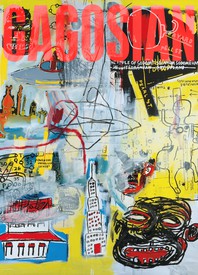
Now available
Gagosian Quarterly Spring 2024
The Spring 2024 issue of Gagosian Quarterly is now available with a fresh cover design featuring Jean-Michel Basquiat’s Lead Plate with Hole (1984).
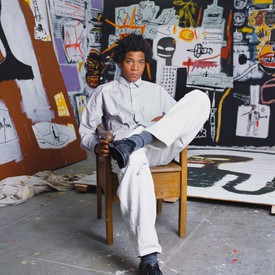
Jean-Michel Basquiat: Los Angeles
Jean-Michel Basquiat’s sisters, Lisane Basquiat and Jeanine Heriveaux, met with filmmaker Tamra Davis, art dealer Larry Gagosian, and author and curator Fred Hoffman to reflect on their experiences with the artist during the 1980s in Los Angeles.
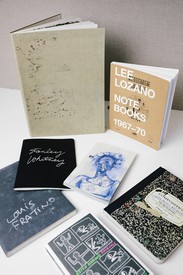
Book Corner
Private Pages Made Public
Megan N. Liberty explores artists’ engagement with notebooks and diaries, thinking through the various meanings that arise when these private ledgers become public.
Visions of the Self: Jenny Saville on Rembrandt
Jenny Saville reveals the process behind her new self-portrait, painted in response to Rembrandt’s masterpiece Self-Portrait with Two Circles.
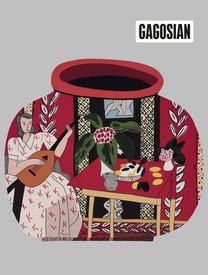
Now available
Gagosian Quarterly Spring 2019
The Spring 2019 issue of Gagosian Quarterly is now available, featuring Red Pot with Lute Player #2 by Jonas Wood on its cover.
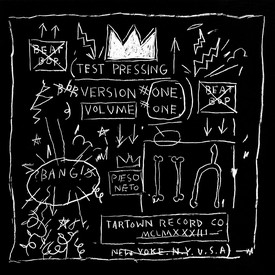
Spotlight
Jean-Michel in Black and White
Fred Hoffman looks back on the creation of Jean-Michel Basquiat’s Tuxedo (1983), examining the work’s significance in relation to identity and the hip-hop culture of the 1980s.
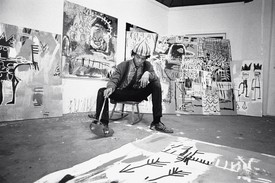
Spotlight
Basquiat
Jean-Michel Basquiat’s Untitled (L.A. Painting) (1982) was a game changer. Text by Derek Blasberg.
Fairs, Events & Announcements
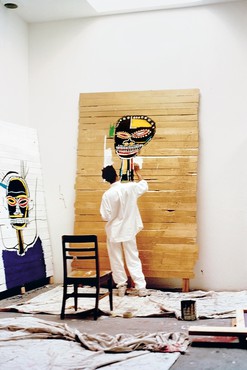
In Conversation
Tamra Davis and Brian Williams on Jean-Michel Basquiat
Moderated by Fred Hoffman
Tuesday, April 2, 2024, 6:30pm
Gagosian, Beverly Hills
Join Gagosian for a conversation between filmmaker Tamra Davis and photographer Brian Williams inside Jean-Michel Basquiat: Made on Market Street at the Beverly Hills gallery. The talk is moderated by Fred Hoffman, who curated the exhibition with Larry Gagosian and is the author of The Art of Jean-Michel Basquiat. The first exhibition to focus exclusively on the works Basquiat produced in Los Angeles, Made on Market Street reflects on this consequential period in his career. During his time in LA, Davis drove the artist, who never learned to drive, around the city and filmed him for what would become her acclaimed documentary Jean-Michel Basquiat: The Radiant Child (2010). Williams, who was Basquiat’s former studio assistant, captured the artist at work during these years and will share never-before-seen archival photographs and footage during the talk.
Jean-Michel Basquiat with Gold Griot (1984) and M (1984) in his studio at 21 Market Street, Venice, California, spring 1984. Artwork © The Estate of Jean-Michel Basquiat. Licensed by Artestar, New York. Photo: B.Dub/Brian D. Williams
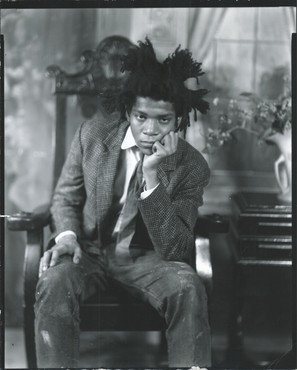
Performance and Talk
The Writing’s on the Wall
Monday, September 11, 2023, 6pm
Grand LA, Los Angeles
kingpleasure.basquiat.com
This event has been postponed. The new date will be announced shortly.
Join the estate of Jean-Michel Basquiat for an immersive experience blending performance and conversation, organized in conjunction with the exhibition Jean-Michel Basquiat: King Pleasure©, on view at the Grand LA through October 15. The evening will begin at 6pm with a viewing of the exhibition, followed by a live performance at 7pm by blues poet, musician, and organizer aja monet, and concluding with a discussion between monet and the artist’s sisters, Lisane Basquiat and Jeanine Heriveaux, moderated by singer Mashonda Tifrere. Delving into the profound impact of language and poetry, the audience is invited to discover the driving forces behind monet’s literary prowess and activism while decoding hidden narratives within Basquiat’s artwork.
Jean-Michel Basquiat, 1982. Photo: James Van Der Zee, courtesy Metropolitan Museum of Art, New York
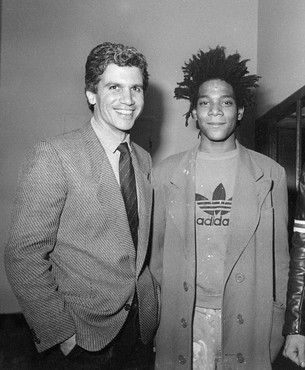
Panel Discussion
Jean-Michel and His LA Experience
With Lisane Basquiat, Tamra Davis, Larry Gagosian, Jeanine Heriveaux, and Fred Hoffman
Wednesday, August 9, 2023, 7:30pm
Grand LA, Los Angeles
kingpleasure.basquiat.com
Larry Gagosian will discuss his experiences with Jean-Michel Basquiat in Los Angeles in the early 1980s with Tamra Davis, Fred Hoffman, and Basquiat’s sisters Lisane Basquiat and Jeanine Heriveaux in a panel conversation organized in conjunction with the exhibition Jean-Michel Basquiat: King Pleasure© at the Grand LA. All speakers had a meaningful relationship with the artist between 1982 and 1984. Gagosian presented two solo exhibitions by the artist at his gallery and allowed Basquiat to stay frequently at his house in Venice Beach. Hoffmann found a studio space for Basquiat in Venice and created a suite of prints with him. Davis drove the artist, who never learned to drive, around Los Angeles and filmed him for what would become her acclaimed documentary Jean-Michel Basquiat: The Radiant Child (2010).
Larry Gagosian and Jean-Michel Basquiat, New York, 1983
Museum Exhibitions
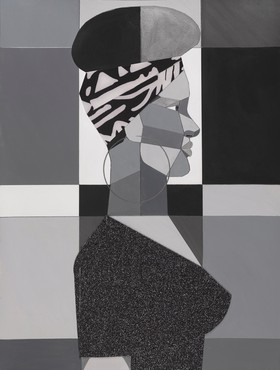
On View
Giants
Art from the Dean Collection of Swizz Beatz and Alicia Keys
Through July 7, 2024
Brooklyn Museum, New York
www.brooklynmuseum.org
Giants, the first major exhibition of the Dean Collection, owned by musical icons Swizz Beatz (Kasseem Dean) and Alicia Keys, showcases a focused selection from the couple’s world-class holdings and spotlights works by Black diasporic artists. Expansive in their collecting habits, the Deans, both born and raised in New York, champion a philosophy of “artists supporting artists.” “Giants” refers to the renown of legendary artists, the impact of canon-expanding contemporary figures, and some of the monumental works in the collection. Work by Derrick Adams, Jean-Michel Basquiat, Titus Kaphar, and Deana Lawson is included.
Derrick Adams, Woman in Grayscale (Alicia), 2017 © Derrick Adams Studio
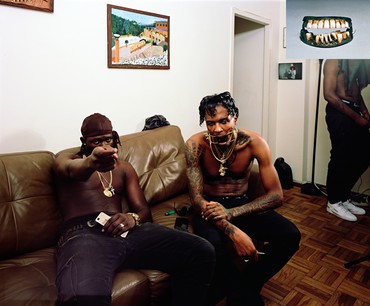
Opening Soon
The Culture
Hip Hop and Contemporary Art in the 21st Century
June 28–September 29, 2024
Cincinnati Art Museum
www.cincinnatiartmuseum.org
Coinciding with the fiftieth anniversary of the birth of hip-hop, this exhibition aims to capture the influence the genre has had on contemporary society through more than ninety works. Including painting, sculpture, photography, installations, video, and fashion, the show is organized around six themes—language, brand, adornment, tribute, ascension, and pose. Work by Derrick Adams, Jean-Michel Basquiat, and Deana Lawson is included. This exhibition originated at the Baltimore Museum of Art.
Deana Lawson, Nation, 2018 © Deana Lawson
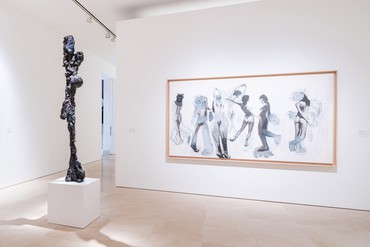
Closed
El eco de Picasso
October 2, 2023–March 30, 2024
Museo Picasso Málaga, Spain
museopicassomalaga.org
Organized as part of Picasso Celebration 1973–2023, a series of international exhibitions and events commemorating the fiftieth anniversary of Pablo Picasso’s death, The Echo of Picasso focuses on his influence on twentieth-century art. The exhibition places Picasso’s practice in dialogue with work by more than fifty artists, including Francis Bacon, Georg Baselitz, Jean-Michel Basquiat, Willem de Kooning, Thomas Houseago, Ewa Juszkiewicz, Richard Prince, Nathaniel Mary Quinn, Cy Twombly, Tom Wesselmann, and Franz West.
Installation view, El eco de Picasso, Museo Picasso Málaga, Spain, October 2, 2023–March 30, 2024. Artwork, left to right: © Rebecca Warren, © Richard Prince. Photo: Pablo Asenjo, courtesy Museo Picasso Málaga
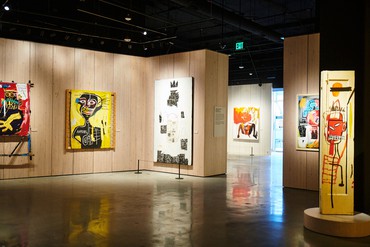
Closed
Jean-Michel Basquiat
King Pleasure©
March 31, 2023–January 1, 2024
Grand LA, Los Angeles
kingpleasure.basquiat.com
Organized and curated by the family of Jean-Michel Basquiat, this exhibition of more than two hundred never-before-seen and rarely shown paintings, drawings, and artifacts tells Basquiat’s story from an intimate perspective, intertwining his artistic endeavors with his personal life, influences, and the times in which he lived. Immersive environments showcase Basquiat’s contributions to the history of art and his explorations of multifaceted cultural phenomena—including music, pop culture, and the Black experience—providing insight into his creative life and his singular voice. This exhibition has traveled from the Starrett-Lehigh Building, New York.
Installation view, Jean-Michel Basquiat: King Pleasure©, Grand LA, Los Angeles, March 31, 2023–January 1, 2024. Artwork © The Estate of Jean-Michel Basquiat. Licensed by Artestar, New York
